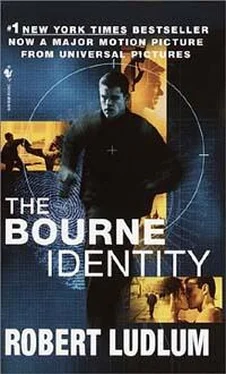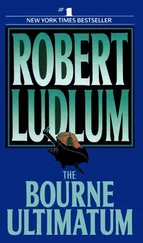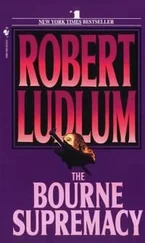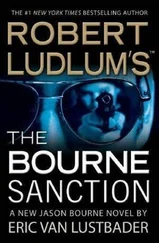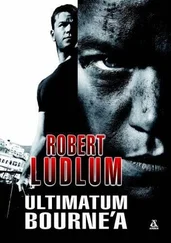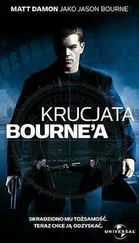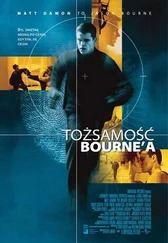“Risks?” Jacqueline Lavier touched her hair again.
“I don’t give ideas away, madame. I generally back them.”
“Yes, I understand. As you say, the idea does have merit.”
“I think so. Of course, I’d like to see what kind of agreement you have with Bergeron.”
“It could be produced, monsieur.”
“Tell you what,” said Jason. “If you’re free, let’s talk about it over drinks and dinner. It’s my only night in Paris.”
“And you prefer the company of more mature women,” concluded Jacqueline Lavier, the mask cracked into a smile again, the white ice breaking beneath eyes now more in concert.
“C’est vrai, madame.”
“It can be arranged,” she said, reaching for the phone.
The phone. Carlos.
He would break her, thought Bourne. Kill her if he had to. He would learn the truth.
Marie walked through the crowd toward the booth in the telephone complex on rue Vaugirard.
She had taken a room at the Meurice, left the attaché case at the front desk, and had sat alone in the room for exactly twenty-two minutes. Until she could not stand it any longer. She had sat in a chair facing a blank wall, thinking about Jason, about the madness of the last eight days that had propelled her into an insanity beyond her understanding. Jason. Considerate, frightening, bewildered Jason Bourne. A man with so much violence in him, and yet oddly, so much compassion. And too terribly capable in dealing with a world ordinary men knew nothing about. Where had he sprung from, this love of hers? Who had taught him to find his way through the dark back streets of Paris, Marseilles, and Zurich … as far away as the Orient, perhaps? What was the Far East to him? How did he know the languages? What were the languages? Or language?
Tao.
Che-sah.
Tam Quan.
Another world, and she knew nothing of it. But she knew Jason Bourne, or the man called Jason Bourne, and she held on to the decency she knew was there. Oh, God, how she loved him so!
Ilich Ramirez Sanchez. Carlos. What was he to Jason Bourne?
Stop it! She had screamed at herself while in that room alone. And then she had done what she had seen Jason do so many times: she had lunged up from the chair, as if the physical movement would clear the mists away—or allow her to break through them.
Canada. She had to reach Ottawa and find out why Peter’s death—his murder—was being handled so secretly, so obscenely. It did not make sense; she objected with all her heart. For Peter, too, was a decent man, and he had been killed by indecent men. She would be told why or she would expose that death—that murder—herself. She would scream out loud to the world that she knew, and say, “Do something!”
And so she had left the Meurice, taken a cab to the rue Vaugirard, and placed the call to Ottawa.
She waited now outside the booth, her anger mounting, an unlit cigarette creased between her fingers. When the bell rang, she could not take the time to crush it out.
It rang. She opened the glass door of the booth and went inside.
“Is this you, Alan?”
“Yes,” was the curt reply.
“Alan, what the hell is going on? Peter was murdered, and there hasn’t been a single word in any newspaper or on any broadcast! I don’t think the embassy even knows! It’s as though no one cared! What are you people doing?”
“What we’re told to do. And so will you.”
“What? That was Peter! He was your friend! Listen to me, Alan …”
“No!” The interruption was harsh. “You listen. Get out of Paris. Now! Take the next direct flight back here. If you have any problems, the embassy will clear them—but you’re to talk only to the ambassador, is that understood?”
“No!” screamed Marie St. Jacques. “I don’t understand! Peter was killed and nobody cares! All you’re saying is bureaucratic bullshit! Don’t get involved; for God’s sake, don’t ever get involved!”
“Stay out of it, Marie!”
“Stay out of what? That’s what you’re not telling me, isn’t it? Well, you’d better …”
“I can’t!” Alan lowered his voice. “I don’t know. I’m only telling you what I was told to tell you.”
“By whom?”
“You can’t ask me that.”
“I am asking!”
“Listen to me, Marie. I haven’t been home for the past twenty-four hours. I’ve been waiting here for the last twelve for you to call. Try to understand me—I’m not suggesting you come back. Those are orders from your government.”
“Orders? Without explanations?”
“That’s the way it is. I’ll say this much. They want you out of there; they want him isolated… That’s the way it is.”
“Sorry, Alan—that’s not the way it is. Goodbye.” She slammed the receiver down, then instantly gripped her hands to stop the trembling. Oh, my God, she loved him so … and they were trying to kill him.
Jason, my Jason. They all want you killed. Why?
The conservatively dressed man at the switchboard snapped the red toggle that blocked the lines, reducing all incoming calls to a busy signal. He did so once or twice an hour, if only to clear his mind and expunge the empty insanities he had been required to mouth during the past minutes. The necessity to cut off all conversation usually occurred to him after a particularly tedious one; he had just had it. The wife of a Deputy trying to conceal the outrageous price of a single purchase by breaking it up into several, thus not to be so apparent to her husband. Enough! He needed a few minutes to breathe.
The irony struck him. It was not that many years ago when others sat in front of switchboards for him. At his companies in Saigon and in the communications room of his vast plantation in the Mekong Delta. And here he was now in front of someone else’s switchboard in the perfumed surroundings of Saint-Honoré. The English poet said it best: There were more preposterous vicissitudes in life than a single philosophy could conjure.
He heard laughter on the staircase and looked up. Jacqueline was leaving early, no doubt with one of her celebrated and fully bankrolled acquaintances. There was no question about it, Jacqueline had a talent for removing gold from a well-guarded mine, even diamonds from De Beers. He could not see the man with her; he was on the other side of Jacqueline, his head oddly turned away.
Then for an instant he did see him; their eyes made contact; it was brief and explosive. The gray-haired switchboard operator suddenly could not breathe; he was suspended in a moment of disbelief, staring at a face, a head, he had not seen in years. And then almost always in darkness, for they had worked at night … died at night.
Oh, my God—it was him! From the living—dying—nightmares thousands of miles away. It was him!
The gray-haired man rose from the switchboard as if in a trance. He pulled the mouthpiece-earphone off and let it drop to the floor. It clattered as the board lit up with incoming calls that made no connections, answered only with discordant hums. He stepped off the platform and sidestepped his way quickly toward the aisle to get a better look at Jacqueline Lavier and the ghost that was her escort. The ghost who was a killer—above all men he had ever known, a killer. They said it might happen but he had never believed them; he believed them now. It was the man.
He saw them both clearly. Saw him. They were walking down the center aisle toward the entrance.
He had to stop them. Stop her! But to rush out and yell would mean death. A bullet in the head, instantaneous.
They reached the doors; he pulled them open, ushering her out to the pavement. The gray-haired man raced out from his hiding place, across the intersecting aisle and down to the front window.
Читать дальше
